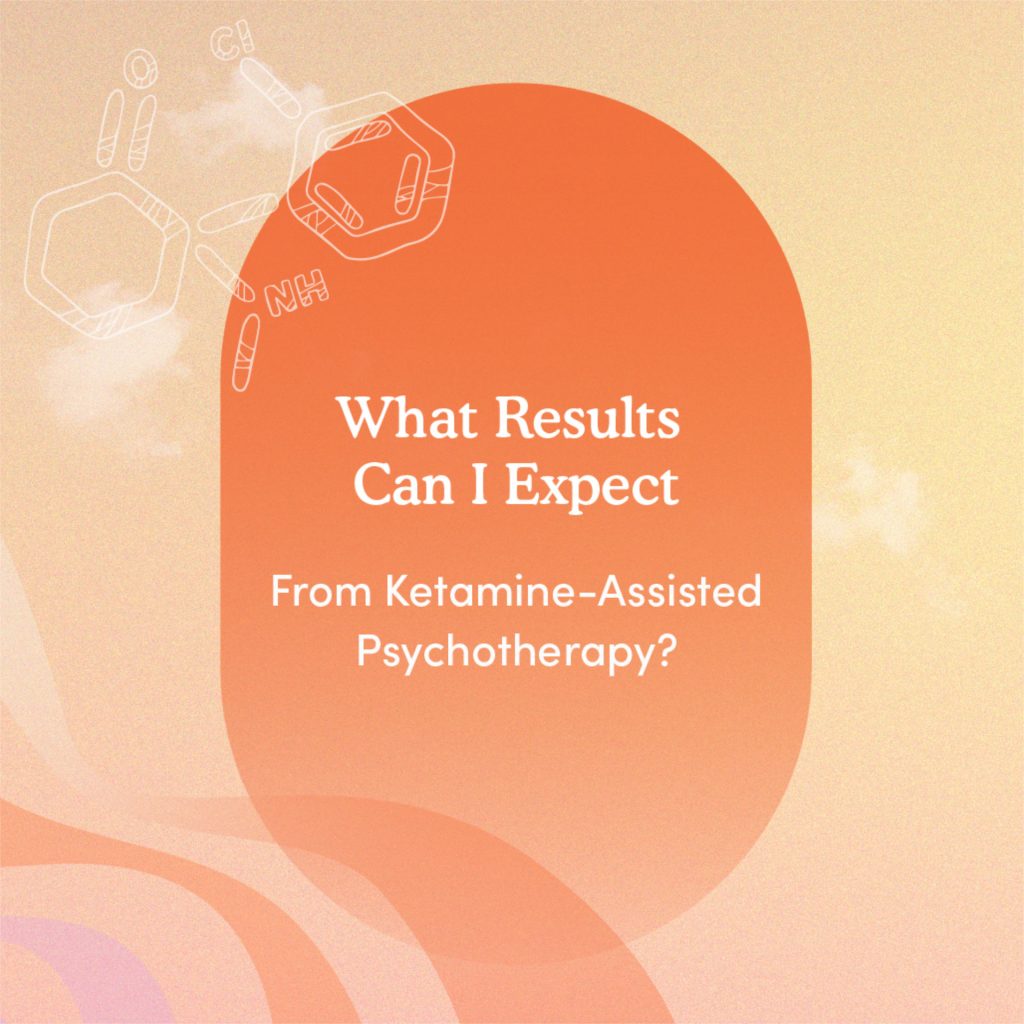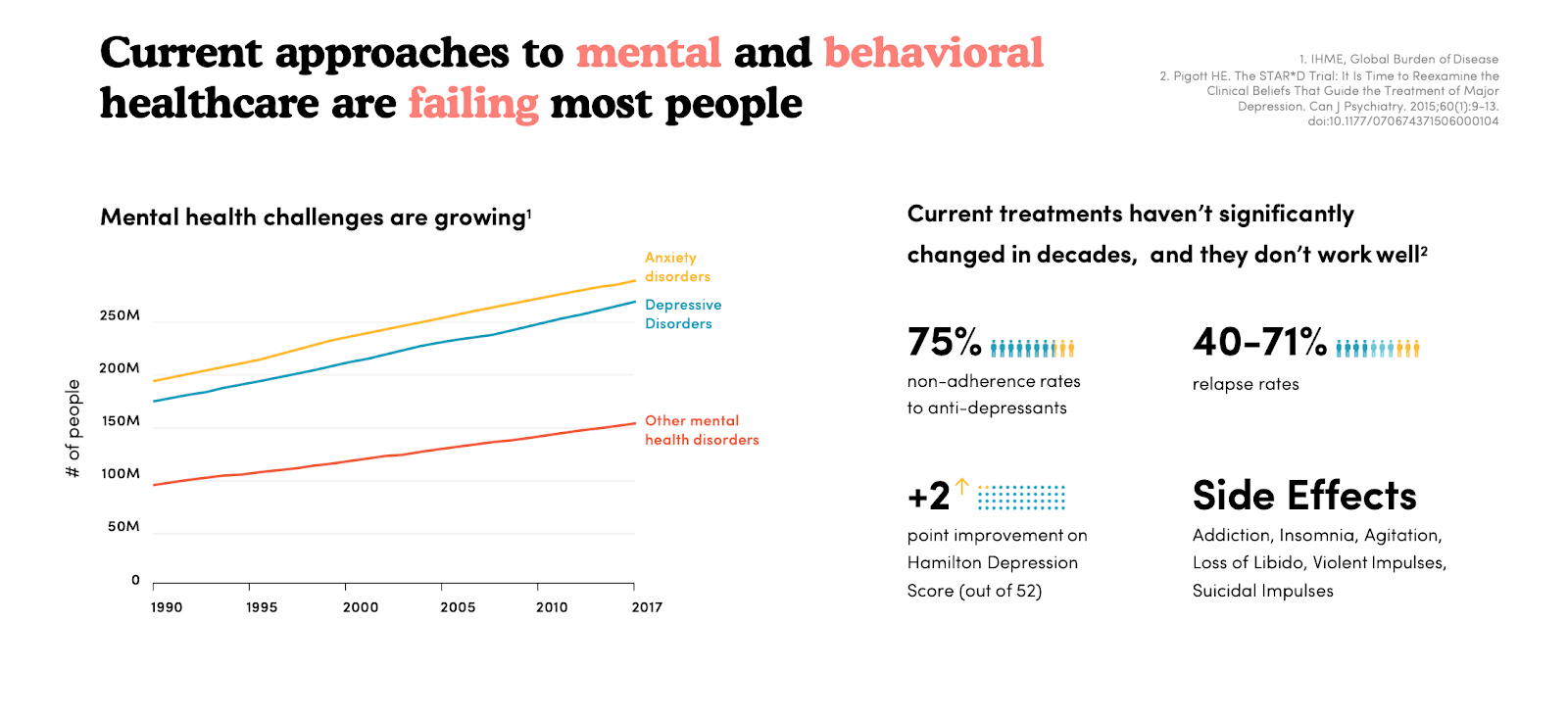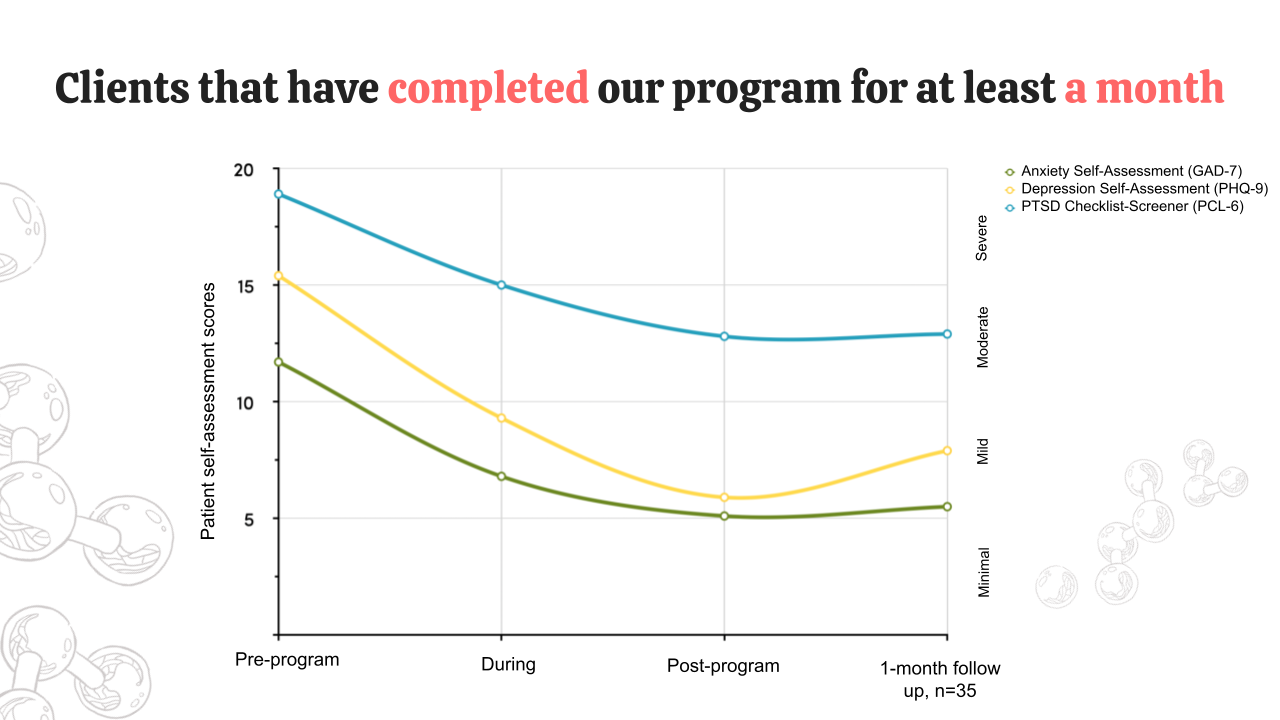
Introduced in the 1960s, Ketamine assisted psychotherapy and use in mental health treatments is newer to the medical field. As such, the public sphere knows much less about how the results of ketamine use in psychotherapy or other mental health treatments differ from other current popular modalities.
Current approaches to mental and behavioral healthcare are failing people. As many as 30% of those with depression have what is classified as treatment-resistant depression. Contemporary treatments for anxiety and trauma such as exposure therapy are often met with steep drop-out rates. Moreover, many medications come with undesirable side effects such as reduced libido, increased suicidality, and risk of addiction. All the while, rates of depression, anxiety, and other mental health disorders are on the rise.

Based on data from IHME, Global Burden of Disease.
Ketamine-assisted psychotherapy (KAP) is a breakthrough form of psychedelic therapy that melds the benefits of therapy and pharmacology for quicker results with less side effects than traditional methods alone.
What are the different diagnoses that can be treated with ketamine assisted therapy?
While used for anesthetic purposes since 1966, ketamine emerged as an innovative treatment for mental health concerns in 2010. As the current psychedelic renaissance gains momentum, ketamine has been leading the way as a legal option for patients with diagnoses like depression, anxiety, post-traumatic stress disorder (PTSD), and more.

In addition to anxiety, depression, and psychological trauma, there is evidence that psychedelic therapies like ketamine may also be beneficial for loss of control disorders including substance use disorders, compulsive behaviors like gambling and skin or hair picking, and eating disorders. In fact, one of the early promoters of psychedelics for mental health was none other than Bill Wilson, the founder of Alcoholics Anonymous, who believed that the spiritual experiences that so often came with psychedelic experiences might be beneficial in recovery from addiction.
What are the various results that can come from ketamine assisted therapy?
Improved Mood
It was like I was born with a new brain after going through those sessions. I never thought I would feel this way in my lifetime, and that I would be able to so effortlessly think and feel the way I finally do about myself.“ Janine – Toronto, ON
Ketamine is gaining traction as a treatment for mood disorders like depression and anxiety. It has also been shown to rapidly reduce suicidality. This is likely due to a variety of neurochemical and structural changes that occur within the brain during ketamine treatment. For example ketamine increases two principal neurotransmitters, GABA and glutamate, which help to simultaneously reduce anxiety while increasing the ability to feel excitement once again.
At our Field Trip Health clinics, 96% of patients experience a reduction in Anxiety immediately after treatment, and 92% report continued reduction one month after. For depression, these numbers are 95% and 89% respectively.
Mindful Adaptability
I learned I had been masking my own symptoms and that I had a compulsive need to make sure everyone around me was okay. The therapy allowed me to understand and manage my anxieties for the first time in years.“ Seth – Chicago, IL
A commonly reported effect of ketamine treatment is more mindful awareness of the world around them, with some patients even describing a perceived improvement in their sense of sight. More commonly, this increased mindfulness shows up as patients begin to feel capable of making more informed and values-aligned choices in their life, feeling unstuck by old patterns, and experiencing more mental clarity. It is hypothesized that these benefits may be due to ketamine’s ability to reset the brain’s default ways of thinking, disrupting old habits and literally growing new neural pathways.
Reconnection to life’s beauty and community
I find myself with a heightened colour perception and an appreciation of beauty almost destroyed by my years of depression. The sensation that the partition between here and there has become very thin is constantly with me.“ Bill Wilson, Founder of Alcoholics Anonymous
Clinical depression often leads to self-isolating behaviors; anxiety, avoidance. Those with trauma often feel a disconnect between themselves and others; some even with different parts of themselves such is the case with dissociative symptoms. Similarly, it is theorized that loss of control disorders (i.e. addiction, eating disorders, gambling, and body-focused repetitive behaviors) may be related to isolation and dissociation.
Ketamine therapy’s unique psychedelic approach positions it to target such feelings of disconnection in ways that other available pharmacological treatment options do not. During the journey (the approximately 40 minutes during which the psychedelic properties of ketamine are strongest), patients frequently experience feelings of transcendental oneness, mystical experiences with high powers, and encounters with other important figures in their life. Therapeutic integration then encourages patients to engage in activities to sustain these feelings of connection between sessions such as by writing a letter to a deceased loved one, spending time outdoors, or artistically depicting scenes from their journey.
A Note on Ketamine & Dissociation
As a dissociative anesthetic, ketamine also creates for some a feeling of separation from their body and sense of self. Though sometimes described as a ‘side effect’, the type of dissociation experienced during a ketamine trip or journey is usually reported by patients to be different from the type of dissociation that may be experienced by a person who has experienced trauma. The easiest way to understand this distinction is to think of it spatially. While traumatic dissociation is like taking a mental step away from an experience to put in space for safety, ketamine dissociation is more like taking a step back to get a different perspective and engage with a subject in a different kind of way. As such, patients are able to use ketamine’s dissociative properties to engage with their own thoughts, feelings, and behavioral patterns in new and more adaptive ways.
How many ketamine therapy sessions does it take to see results?
One systematic review found that for suicidality, some of the earliest results were seen just 40 minutes after ketamine infusion. A specific study cited in that review saw relief from suicidal ideation for the 10 days after one infusion of ketamine lasting 1-2 minutes. That said, ketamine has been best studied as a treatment series for depression of 6 injections over 3 weeks.
At Field Trip, we give patients with trauma the flexibility of reducing frequency to spread over 6 weeks so as to provide additional supportive integration therapy sessions and minimize the risk of overstimulating a person whose nervous system is already overworked.
Will I be ‘cured’ after ketamine assisted therapy?
Research by Mandal, Sinha and Goyal (2019) demonstrated the strongest antidepressant effects from ketamine lasting at least between 2 weeks and one month, with sustained remission extending beyond that. Participating in therapy alongside ketamine injections seems to prolong these effects even further as evidenced by subjective reports at patients’ one month follow-up appointment.
At our clinics, ketamine is viewed as a catalyst for recovery; therapy, a collaborative process. During ketamine-assisted psychotherapy, patients and therapists identify adaptive behaviors to support a meaningful life rooted in the patient’s values. Patients are then encouraged to begin implementing these behaviors while the neuroplastic effects of ketamine make behavioral changes easier.
Through the continuance of these behaviors and other integrative practices, some patients are able to sustain their results from ketamine indefinitely. Others may benefit from occasional ketamine booster treatments. Our medical and therapeutic team are there to support you in deciding a long-term plan that works for you.
What if ketamine assisted therapy does not work for me?
Zarate et al. (2006) found a beneficial response rate to ketamine of over 70%. That said, no treatment affects any one person the same. The efficacy of ketamine therapy can vary due to a variety of biological, historical, and environmental factors which may contribute to their presenting mental illness. If a patient’s lifestyle is unsustainable before ketamine treatment, it is likely they will continue to find it unsustainable after. Those that get the best results from ketamine are those most willing to use their ketamine treatment period to make sustainable change.
Interested in speaking with one of our registered therapists to see if Ketamine assisted psychotherapy is right for you? Field Trip Health has clinics across Canada in Toronto, Montreal, Vancouver, Ottawa, Hamilton, Kitchener-Waterloo, Thunder Bay, and Sault Ste. Marie, and an at-home program for those who live more than an hour from the nearest clinic. If you are ready to begin your journey toward healing and build your personalized treatment plan, then book a free discovery call with one of our team members.